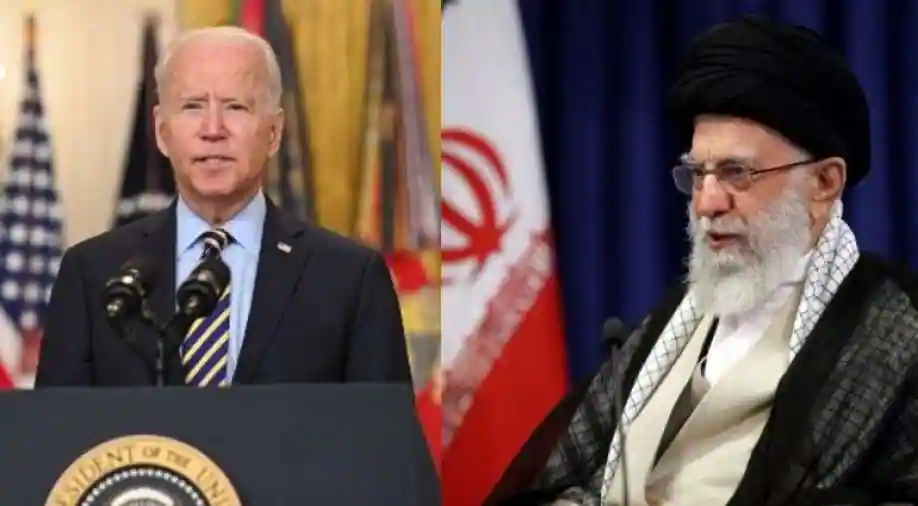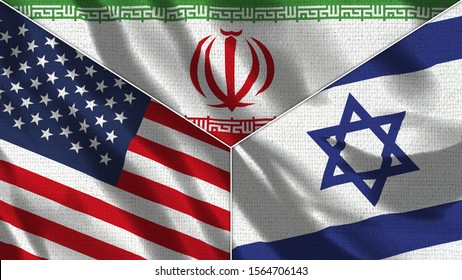As top U.S. and Israeli officials met to discuss options in the event that ongoing talks with Iran to revive the 2015 nuclear deal do not produce a lasting agreement, Iran has issued a warning that any military force taken against the Islamic Republic would be unsuccessful and met with a comparable response.
Israeli Defense Minister Benny Gantz met with his U.S. counterpart Lloyd Austin and Secretary of State Antony Blinken on Thursday in Washington. Reuters cited U.S. officials as saying that potential military scenarios against Iran’s nuclear program were to be discussed in the meeting.
During a press conference that same day, State Department spokesperson Ned Price did not confirm the agenda of the meeting, but said that U.S. officials were “discussing those alternatives” in the event that “the path to diplomacy towards a mutual return to compliance isn’t viable in the near term,” as the U.S. and Iran talk indirectly via other parties to the Joint Comprehensive Plan of Action that was abandoned by the U.S. in 2018.
“We are discussing those options with our close partners, with our close allies, and that includes with the Israelis,” Price said. “We have already had good discussions with the Israelis about the path forward and how we can work together to ensure that Iran is never able to acquire a nuclear weapon.”
Following his talk with Austin, Gantz said he “shared strategic challenges with an emphasis on the Iranian nuclear threat and the need to deepen our dialogue and cooperation, including on topics of military readiness to stop and face Iran’s regional aggression,” while the U.S. defense chief said the two “discussed our concern with recent Iranian actions and affirmed U.S. commitment to Israel’s security and preventing Iran from obtaining a nuclear weapon.”
In response to the latest developments, Iran’s permanent mission to the United Nations told Newsweek that “this is not the first time that the language of threat against Iran’s peaceful nuclear program is being used by the US and the Israeli regime.”
The mission argued that Iran’s nuclear program was never intended to produce a weapon, highlighting findings by the International Atomic Energy Agency. It pointed instead to Israel, which is widely believed to wield nuclear weapons, which it routinely neither confirms or denies, and the U.S. nuclear modernization campaign that the mission argues is a violation of the Treaty on the Non-Proliferation of Nuclear Weapons.
“As has been confirmed by numerous IAEA reports, Iran’s nuclear program is entirely peaceful,” the mission said. “Unlike the Israeli regime who possesses hundreds of nuclear warheads and the US who constantly upgrades its nuclear arsenal in contravention of its NPT obligations, nuclear weapons have no place in Iran’s defensive doctrine.”
“However,” the mission added, “we’ll continue our peaceful nuclear program and exercise our right of self-defense in the face of any act of aggression against our territory.”
The mission further called on Washington to commit to the ongoing JCPOA negotiations amid the seventh round of talks in the Austrian capital of Vienna, and warned Israel against verbal or military attacks against Tehran.
“Instead of resorting to threats and intimidation, the US is well advised to implement its JCPOA obligations and put aside the bankrupt policy of maximum pressure and lift all illegal sanctions against the Iranian people,” the mission said. “The policy of Iran-phobia promoted by the Israeli regime will doom to fail and this regime is reminded that any adventuristic designs against Iran will be dealt will swiftly and with all vigor.”
Reached for comment by Newsweek, an Israel Defense Forces official confirmed that the Israeli military was training to conduct operations abroad in response to developments concerning Iran.
“The Chief of the General Staff instructed the IDF, in accordance with the decision of the political echelon, to prepare the IDF for operations in distant arenas,” the IDF official said. “The IDF is constantly training for a number of scenarios in all regions and arenas, and maintains a comprehensive training schedule. Included in the IDF’s training schedule are its frequent exercises with allies and partners around the world.”
Among the planned IDF drills is a massive set of maneuvers set to be held next spring hundreds of miles away across the Mediterranean Sea, roughly the same distance required to strike targets in Iran.
“The Iranian regime continues to pose a serious challenge to Israel’s security and the stability of the region,” the IDF official said. “Iran constitutes not only a regional, but a global challenge.”
“Preparations to deal with the Iranian challenge also included the establishment of a new directorate that is dealing, among other things, with: the Iranian military nuclear program, Iranian regional entrenchment and weapons proliferation,” the official added.
Israel has been vehemently opposed to the JCPOA since its inception, and former Israeli Prime Minister Benjamin Netanyahu openly sought to dissuade former President Barack Obama, whom President Joe Biden served as vice president, from entering into the agreement alongside Iran and top power China, France, Germany, Russia and the United Kingdom. Netanyahu applauded Trump’s unilateral exit and the “maximum pressure” campaign that ensued.
As U.S.-Iran tensions mounted under Trump, instability erupted across the Persian Gulf and the broader Middle East region as Iran and Israel accused one another of conducting unclaimed attacks. A number of these incidents have taken place at sea, where Iran has been charged with strikes against international shipping vessels, while Israel has been blamed for bombing ships carrying Iranian oil to Syria.
Israel has also continued to conduct air raids against suspected Iran-linked targets in Syria and has been accused of operations within Iran itself, including the assassination of a nuclear scientist last year and acts of sabotage against the country’s nuclear infrastructure. Iran, for its part, has fostered close ties with militias across the region who share the Islamic Republic’s enmity for Israel.
Since coming to office in January, the Biden administration has sought to reenter the nuclear deal, but has so far maintained the intensive sanctions that the Trump administration imposed on Iran. And, like Trump, Biden has not ruled out a military option against Iran.
Asked about military scenarios, Pentagon Press Secretary John Kirby elaborated on Austin’s discussion with Gantz during a press conference later Friday.
“What the secretary said was that President Biden had said that he wants to see diplomacy succeed—and should it fail, he’s open to considering other options,” Kirby said. “There’s lots of options available to the commander-in-chief, to the president, and I’m not going to speculate one way or another about what they might be.”
He added, however, that “we have a robust presence in the region, we have national security interests in the region, and the secretary’s job is to defend those national security interests, so we’re going to continue to do that.”
Arguments over economic restrictions and tough rhetoric are some of the several obstacles that have stalled the Vienna talks launched in April. Since then both Israel and Iran held presidential elections that brought new leaders perceived in some ways as even more hardline than their predecessors, but so far they have largely pursued similar lines as their predecessors in terms of foreign policy.
Iranian President Ebrahim Raisi, who took office in August, has previously expressed skepticism toward the JCPOA founded under his predecessor, Hassan Rouhani. But he has since renewed Tehran’s vows to pursue diplomacy in order to facilitate a U.S. return to the nuclear accord in exchange for Iran reinstituting limits that were suspended as a result of Western parties failing to live up to the deal.
But the resumption of talks late last month came with no breakthrough, and both Tehran and Washington continue to question the other’s commitment.
“We are all in Vienna to negotiate and reach a good agreement,” Iranian Foreign Minister Hossein Amir-Abdollahian wrote in an Instagram post. “The Western parties should know that in the last eight years, enough has been said and many promises have been made without action, but today is the time to act and we are working to reach a serious and good agreement.”
“Iran’s nuclear program is quite peaceful,” he added, “but resolving the alleged concerns of the Western parties is directly related to the complete lifting of sanctions.”
READ ALSO: With millions facing starvation Afghanistan is on brink of collapse
That same day, White House Press Secretary Jen Psaki also expressed a U.S. preference to resolve the issue through talks, but warned that “regardless of how we get there, the United States is committed to the fact that Iran must never be allowed to acquire a nuclear weapon.”
“If diplomacy cannot get on track soon, and if Iran’s nuclear program continues to accelerate, then we will have no choice but to take additional measures to further restrict Iran’s revenue-producing sectors,” Psaki said.
That same day, White House Press Secretary Jen Psaki also expressed a U.S. preference to resolve the issue through talks, but warned that “regardless of how we get there, the United States is committed to the fact that Iran must never be allowed to acquire a nuclear weapon.”
“If diplomacy cannot get on track soon, and if Iran’s nuclear program continues to accelerate, then we will have no choice but to take additional measures to further restrict Iran’s revenue-producing sectors,” Psaki said.














